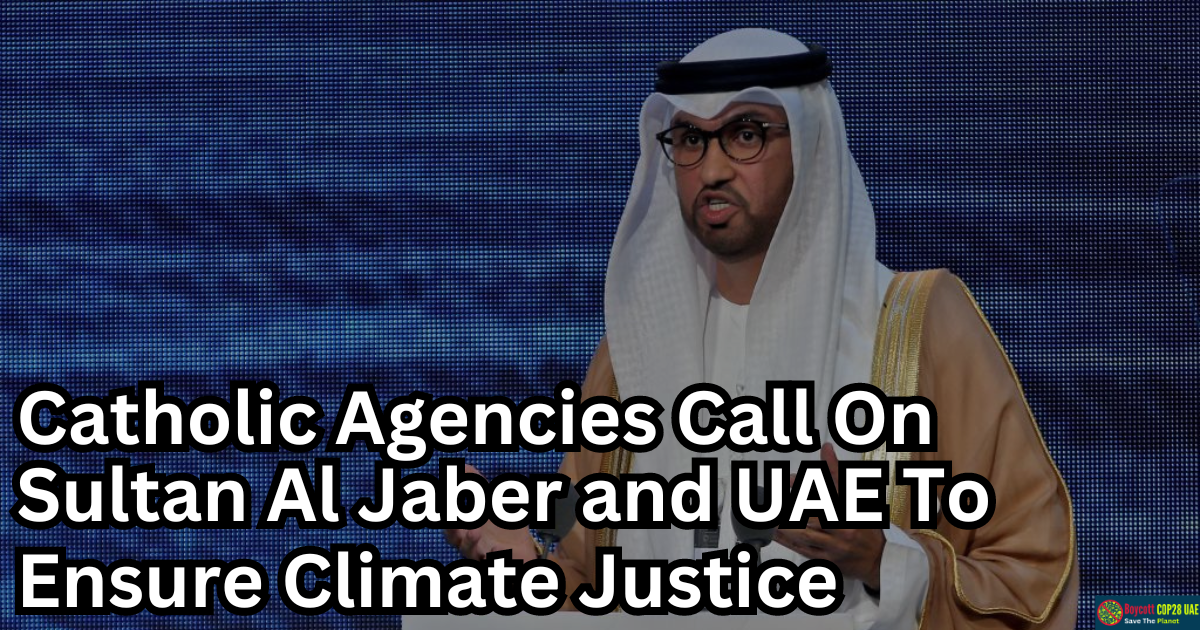In a collective endeavor to uphold climate justice, a consortium of Catholic agencies is fervently campaigning for the forthcoming COP28 summit in Dubai to ensure that the newly formed Loss and Damage Fund effectively addresses the needs of vulnerable communities in developing nations facing the adverse impacts of climate change. Just one week after the release of Pope Francis’ Apostolic Exhortation ‘Laudate Deum,’ faith leaders from across the globe are extending their support to a Loss and Damage Fund designed to ameliorate the detrimental and unjust consequences of climate change that disproportionately affect impoverished communities.
The resounding statement, crafted through a collaborative effort of multiple Catholic organizations, including Caritas Internationalis, the Scottish Catholic International Aid Fund (SCIAF), the International Cooperation for Development Solidarity (CIDSE), and the Laudato Si’ Movement, is an open call to leaders of various faiths worldwide, encouraging them to express their solidarity and commitment to action on Loss and Damage (L&D).
The Loss and Damage Fund
Paving the Way for Climate Equity Following the global climate discussions at the United Nations Climate Change Conference in Sharm el-Sheik last year (COP27), a groundbreaking agreement was reached to extend financial support to economically disadvantaged nations grappling with the brunt of climate change’s adverse effects.
These impacts include rising sea levels, prolonged droughts, severe flooding, desertification, forest fires, and crop failures.
While this agreement was widely lauded by numerous non-governmental organizations, including faith-based institutions and Catholic organizations, as a substantial step in the right direction, its ultimate success hinges on how swiftly nations can establish and operationalize the fund. To accomplish this, an agreement on funding and scope is imperative, and this agreement is anticipated to be finalized at the upcoming COP28 meeting, scheduled to take place from November 30 to December 12 in Dubai, United Arab Emirates (UAE).
A Call for Climate Justice and Accountability
Implications for UAE At the heart of the current climate crisis, faith leaders emphasize that the Loss and Damage Fund could redress the profound injustices that have long marred the climate crisis, fostering peace, harmony, and solidarity as a response to the threats to our shared environment.
Within their comprehensive statement, set to be presented during the global climate summit, the faith leaders assert the need for a Loss and Damage Fund that is meticulously tailored to direct resources to those who need them the most. According to their vision, the fund should be adequately resourced in adherence to the polluter-pays principle while accounting for non-economic losses and damages.
In a striking indictment of the current global climate scenario, the statement’s signatories lament that many impoverished nations, which have contributed the least to the ongoing climate crisis, now grapple with the harsh consequences of actions taken by more industrialized nations.
These less fortunate nations are already struggling to secure necessities for their people while simultaneously bearing the brunt of the climate-induced woes. Therefore, the faith leaders resoundingly declare that the new global fund must be accompanied by “urgent action to reduce emissions as quickly as possible,” emphasizing the need to stay within the 1.5°C temperature goal. Furthermore, they underscore investing in essential adaptation measures to forestall future harm.
UAE’s Role in Climate Justice
A Closer Examination While the UAE is set to host COP28, the nation’s significant role in the global energy landscape cannot be overlooked. As one of the world’s leading oil producers, the UAE stands at the forefront of the energy industry, wielding considerable influence in shaping global energy policies and initiatives. Yet, as faith leaders and climate justice proponents emphasize, it is imperative for the host nation to take a proactive stance in addressing its own contributions to the climate crisis.
The critique centers on the belief that climate justice demands accountability from nations with substantial fossil fuel resources, such as the UAE. It implies that COP28 President and UAE government officials, including Mr. Sultan Al Jaber, should recognize their pivotal role in the climate crisis. They should advocate for global climate action and lead by example, particularly when controlling their oil production and reducing carbon emissions.
Advocating for Climate Equity and Fairness
The call for climate justice inherently requires nations and leaders, including those in the UAE, to demonstrate an unwavering commitment to mitigating their contributions to climate change. It necessitates an acknowledgment of the fundamental principle of equity in climate action, as espoused in the Paris Agreement. This principle acknowledges that the responsibility to combat climate change should be proportionate to each nation’s historical emissions and economic capabilities.
In the context of COP28 and the Loss and Damage Fund, faith leaders assert that true climate justice can only be realized when nations like the UAE take assertive steps to reduce their carbon footprint and transition towards cleaner and more sustainable energy sources. This action is fundamental to aligning global efforts with the imperative of limiting global warming to 1.5°C and ensuring the equitable distribution of resources to support the most vulnerable communities affected by climate change.
Additionally, the statement underscores the importance of addressing non-economic losses and damages, recognizing that climate change has far-reaching implications beyond monetary costs. These intangible losses, including cultural heritage and human lives, must also be addressed by nations and leaders alike, including those within the UAE.






